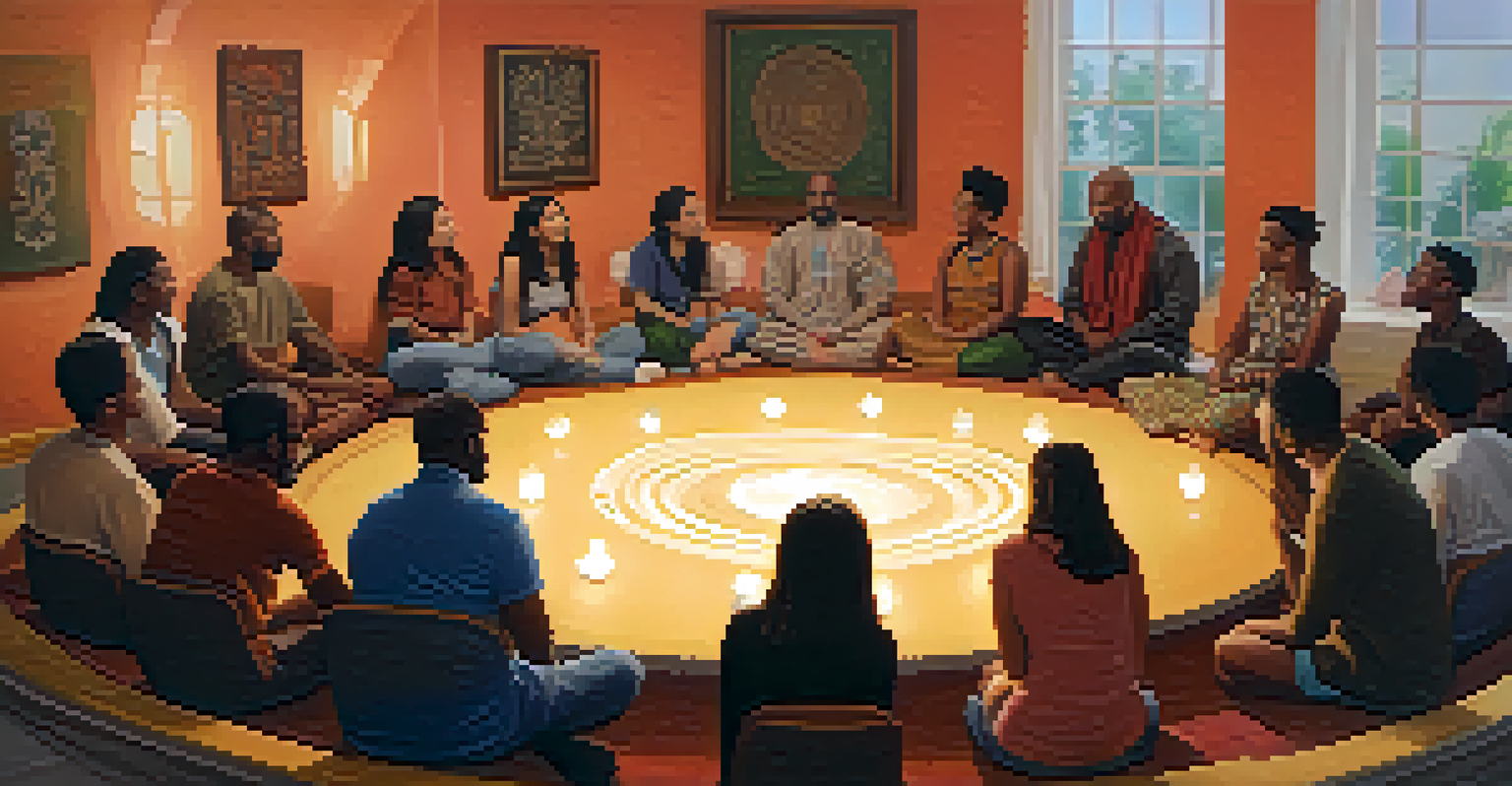How Spiritual Beliefs Shape Our Daily Decision-Making Process

Understanding Spirituality and Its Influence
Spirituality encompasses a broad range of beliefs and practices that connect individuals to something greater than themselves. It can include organized religion, personal beliefs, or even a sense of connection to nature. Understanding how these beliefs shape our actions helps us recognize the underlying motivations in our daily choices.
The more we connect with our spiritual self, the more we are able to make decisions that align with our true values.
For many, spiritual beliefs provide a moral framework that guides decisions. This framework often influences how individuals prioritize their values, such as compassion, integrity, and service to others. When faced with a dilemma, these values can be the compass guiding their choices, shaping their interactions with the world.
Moreover, spirituality can foster a sense of purpose and meaning in life. This sense of purpose often leads to more intentional decision-making, as individuals seek to align their actions with their deeper beliefs. Recognizing this connection can lead to a more harmonious life, where choices resonate with personal values.
The Role of Intuition in Decision-Making
Intuition often plays a significant role in how spiritual beliefs affect decision-making. Many individuals report a gut feeling or inner voice that guides them, which they attribute to their spiritual beliefs. This intuitive sense can help navigate complex situations where logical reasoning may fall short.

For example, someone may feel compelled to help a stranger in need, driven by a spiritual belief in compassion. This intuitive action reflects their values and often leads to a fulfilling experience, reinforcing their spiritual connection. Such moments highlight how intuition and spirituality can work hand in hand in shaping our choices.
Spirituality Shapes Decision-Making
Spiritual beliefs provide a moral framework that guides individuals in making intentional and value-aligned decisions.
Additionally, this intuitive guidance can be cultivated through practices like meditation or prayer. These practices help individuals tune into their inner selves, enhancing their awareness of spiritual insights. As a result, they become more attuned to their intuition, leading to more aligned and meaningful decisions.
How Spiritual Communities Influence Decisions
Being part of a spiritual community can significantly impact decision-making processes. These communities often share similar beliefs, values, and practices, creating a supportive environment for individuals. This collective influence can encourage members to make decisions that align with the group's spiritual principles.
In the end, the only thing that matters is how we treat each other and how we connect with our own spirit.
For instance, in religious communities, members may collectively decide to engage in charitable activities, reinforcing the value of service. The social aspect of these communities can provide motivation and accountability, making it easier to stick to decisions that reflect shared beliefs. This sense of belonging enhances the decision-making process.
Moreover, communal discussions and shared experiences can broaden individual perspectives. Hearing different viewpoints within a spiritual context can help individuals refine their beliefs and, consequently, their choices. This exchange of ideas fosters growth and can lead to more thoughtful, informed decisions.
Spirituality and Ethical Decision-Making
Spiritual beliefs often play a crucial role in ethical decision-making. Many individuals draw upon their spirituality when faced with moral dilemmas, seeking guidance from their beliefs. This reliance on spiritual values can lead to more principled choices that prioritize integrity and ethics.
For example, someone may grapple with a business decision that conflicts with their spiritual beliefs about honesty. In this scenario, their spiritual framework can prompt them to choose transparency over short-term gain, reflecting their commitment to their values. Such decisions may not always be easy, but they often lead to greater satisfaction and alignment with one’s beliefs.
Intuition Enhances Choices
Intuition, often nurtured by spiritual practices, can guide individuals through complex decisions, aligning actions with deeper beliefs.
Furthermore, the practice of reflection, common in many spiritual traditions, encourages individuals to consider the broader impact of their decisions. This reflection can lead to a deeper understanding of the ethical implications of their choices, guiding them to make decisions that benefit not only themselves but also the community and the environment.
Practices That Enhance Spiritual Decision-Making
Several practices can enhance the influence of spirituality on decision-making. Mindfulness, for instance, allows individuals to stay present and connect with their inner selves. By practicing mindfulness, one can better assess their thoughts and feelings, leading to more conscious and deliberate choices.
Another practice is journaling, which can facilitate self-reflection and clarity. Writing about decisions and the underlying feelings can illuminate how spiritual beliefs are influencing choices. This process often helps individuals articulate their values and align their decisions with their spiritual beliefs.
Lastly, seeking guidance through prayer or meditation can provide valuable insights. These practices can create a space for individuals to connect with their spirituality, fostering a clearer understanding of their values. As a result, they may find themselves making decisions that resonate more deeply with their authentic selves.
The Impact of Spirituality on Relationships
Spiritual beliefs can significantly shape how individuals approach relationships and interpersonal dynamics. Many people find that their spirituality encourages them to practice empathy, forgiveness, and love. These qualities can foster healthier, more meaningful connections with others.
For instance, someone whose spiritual beliefs emphasize compassion may be more inclined to resolve conflicts peacefully. Their decisions in relationships are often guided by a desire to uphold these spiritual values, leading to more harmonious interactions. This alignment can create a positive ripple effect, enhancing the overall quality of relationships.
Community Influences Decisions
Being part of a spiritual community fosters shared values, enhancing decision-making through support and collective accountability.
Additionally, shared spiritual beliefs can strengthen bonds between individuals. When two people share similar values, it can deepen their understanding and support for one another. This shared foundation often influences their decision-making together, leading to choices that reflect their collective beliefs and aspirations.
Navigating Life Changes Through Spirituality
Life changes, whether welcome or challenging, can be daunting to navigate. Spiritual beliefs often provide a framework for understanding and coping with these transitions. They can offer comfort, guidance, and a sense of purpose during times of uncertainty.
For example, someone experiencing a career shift might turn to their spiritual beliefs for clarity. They may reflect on their values and purpose, allowing them to make decisions that align with their long-term goals. This alignment can reduce anxiety and foster confidence during times of change.

Moreover, spiritual practices like meditation or prayer can provide solace and perspective. Engaging in these practices allows individuals to process their feelings and connect with their inner wisdom, leading to more thoughtful and intentional decisions as they navigate life’s ups and downs.